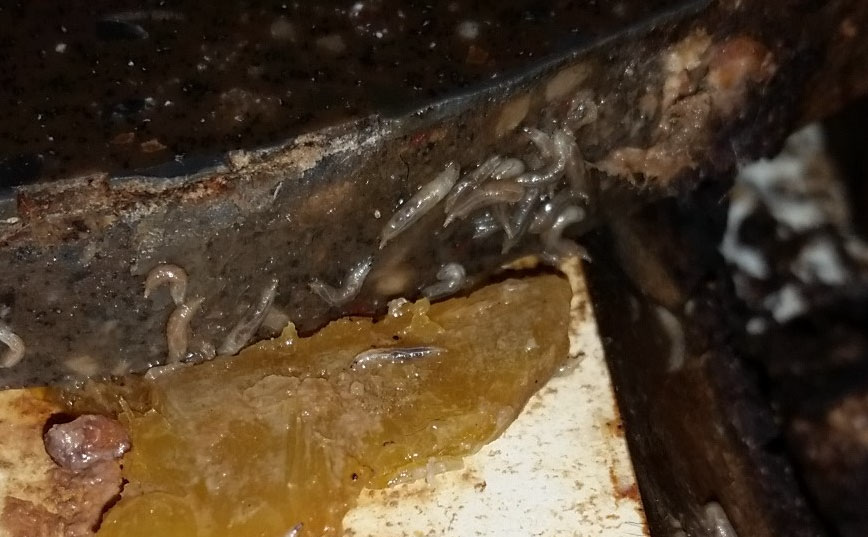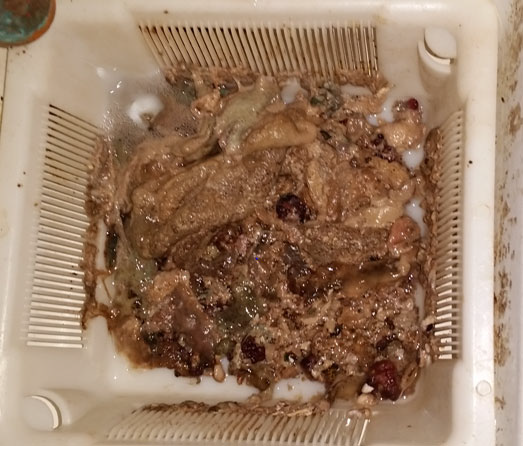04
Jun
Starbucks Sued for Illegally Using Carcinogenic Pesticide Near Food and Beverages

Hot Shot No Pest Strip placed near bagels and pastries in Starbucks store
(Beyond Pesticides, June 4, 2019) A class-action lawsuit is accusing Starbucks stores in New York of misusing a highly toxic, carcinogenic pesticide near food, putting the health of customers and employees at risk. “Stores throughout Manhattan have for many years been permeated with a toxic pesticide called Dichlorvos [DDVP], which is highly poisonous and completely unfit for use in proximity to food, beverages and people,” the suit reads.
According to the lawsuit, Hot Shot brand No Pest Strips were placed in food areas in violation of labels that prohibit the pesticide’s use in “the food/feed areas of food/feed processing or food/feed manufacturing or food/feed service establishments.” A pest control operator found the illegally placed products on a number of separate occasions, hidden under bagels or in pastry display cases, during a five year period from 2013 to 2018. This was not at only one location, but appeared to be a common occurrence at nearly every one of the 100+ stores serviced by the pest control operator.
The case brings to light a number of issues with the use of synthetic pesticides. The unsanitary conditions permitted to persist within Starbucks stores, per the pictures provided in the suit (see page 14), are indicative of an overreliance on synthetic pesticides to treat routine pest issues. This approach relies solely on a chemical solution to address pests, treating them as symptoms, while ignoring the root causes of pest problems, which can be more effectively addressed through proper sanitation, for example.
According to the suit, the pest control operator relayed the information on the illegal pesticide use to his manager, who subsequently alerted Starbucks. Numerous complaints were filed with Starbucks management, and the New York Department of Health cited the company for illegal pesticide use. Despite these warnings, the suit indicates that Starbucks’ Regional Quality Assurance Manager had admittedly, “failed to internalize ‘the importance of breaking this habit’ and instead continued to misuse DDVP in Manhattan-area stores with impunity.”
Stores continue to use the pesticide to this day, the suit alleges, “having made the decision that it is more cost effective to pay for the strips than clean up the underlying root cause of the infestations—the unsanitary conditions that pervade its Manhattan stores.”
The vast majority of common pest problems require no pesticide use at all. An organic pest management approach aims to correctly identify pests, monitor, determine action levels, keep records, and focus on prevention tactics. This approach emphasizes sanitation, structural repairs, proper food storage, and other methods that eliminate pest habitat.

Unsanitary conditions documented in lawsuit against Starbucks
Dichlorvos is an organophosphate insecticide with strong links to cancer. EPA indicates it has “suggestive” evidence of carcinogenicity, and it is listed as a carcinogen under California Prop 65. As Beyond Pesticides writes in its fact sheet on the chemical, “EPA has determined that the worst-case cancer risk to workers handling DDVP, even when wearing protective clothing, ranged up to 1/100 for exposures that amount (in many cases) to only a couple of weeks of work per year… concerning inhalation exposures encountered by ordinary consumers, EPA estimates that the cancer risk to people with No-Pest™ strips hanging in their homes may be as high as 8/1000.”
It is important to be reminded that this is a level of risk – 1 out of 100 applicators and 8 out of 1,000 home users contracting cancer – that EPA accepts as reasonable under its current review process that allows pesticides in the marketplace.
The chemical has a strong propensity to off-gas when used in “strips” similar to those in Starbucks stores, and apart from cancer concerns, poses acute risks to exposed individuals. It is easily absorbed by the body both through skin contact and food consumption. Like other pesticides in the organophosphate chemical class, DDVP inhibits a critical nervous system enzyme called acetylcholine esterase. Acute symptoms include headaches, stomach cramps, excessive salivation, muscle twitching, and in some cases delayed neuropathy.

Unsanitary conditions documented in lawsuit against Starbucks
Do not be like Starbucks. If you have a pest problem, address it early by internalizing good pest management practices into your daily routines. Make sure messes are cleaned up after they are made, food is stored in tightly sealed containers, water and dishes are not left out, floors are clear of food debris, leaky faucets are repaired, and that windows are tightly sealed and doors have door sweeps to prevent pest entry. This any other simple techniques can keep homes and businesses pest free. And in cases where, despite your best efforts, you do have a pest problem, check out Beyond Pesticides’ ManageSafe page for nontoxic practices to address the issue, and least-toxic pest control products that should be used only as a last resort.
All unattributed positions and opinions in this piece are those of Beyond Pesticides.
Source: CBS News, Wigdor LLP, Class Action Complaint











Starbucks continued to use and buy these pesticides into 2020, long after our lawsuit was filed. It’s all on the docket.
August 3rd, 2021 at 7:20 pm